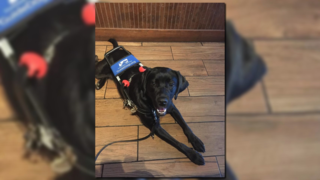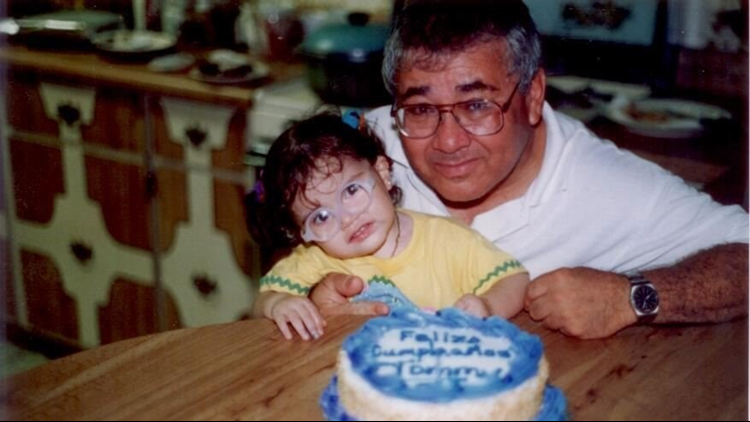TAMPA -- One of the first things someone with a service dog will tell you is not to touch or distract a dog while it is walking in its harness.
Zoe Garcia knows this all too well.
"If you see a person with a guide dog, please don't pet them because they're working, and please don't make any distracting noises," she said.
Stepping into Garcia’s shoes for the day, we saw firsthand just how much people stared or whispered to each other or just made noises to try to get the dog’s attention.
Growing up blind has presented some unique challenges for Zoe. But then she matched with Fezzi, a black lab who doesn’t let her lack of vision get in the way of her dreams and aspirations.
Zoe suffers from Bilateral Colobomas, a genetic disease that causes degenerative eyesight, and retinal detachment issues.
"My left eye was the one that was damaged the most, so I don't see anything out of my left eye, I can see colors and lighting but that's it," Garcia said. "In my right eye, it's mostly central vision. I can see shapes, I can see words, but not like really tiny words. Like it has to be like 20-font. And I can't see anything past like 20 feet, it's like blurred out."
The 21-year-old student is studying for her bachelor's degree in Environmental Science and Policy at the University of South Florida, hoping to eventually earn a masters and Ph.D.
Growing up in Puerto Rico
Zoe never really knew any different than dealing with her disabilities on her own and with the help of her family.
"When I was in Puerto Rico, they never had mobility for me," Garcia said. "Being blind has -- it's really hard to make friends over there, and sometimes you feel like you're being left out because you're just visually impaired."
She attended mostly military schools while she was in Puerto Rico.
Her mom, Edna Garcia, says the family struggled to watch her deal with her disability in the beginning, but soon learned to take it day by day.
"Life taught me that you have to live day by day and you learn by experience," Edna said. "People are cruel, but I always told Zoe, ‘you know, you can do it.’ People need to understand that you can do whatever you want in life."
Zoe's biggest concern in school was that she just wanted to be treated normally, but with minor accommodations to help her learn and be a better student.
"Zoe wasn't different, we were just like normal kids," Garcia’s sister, Camille said. " I didn't see her with like any condition, we treated each other the same."
Camille knew no different than her sister's seeing disabilities. She glowed when she spoke about her relationship with her older sister.
"We're really close, like really close as siblings, so she's always relying on me, I'm always looking for her," Zoe's sister, Camille added.
But being the only blind child in school presented its unique challenges.
“For my condition, I was the only kid in school that was blind," Zoe said. "I didn’t know anyone else.”
She remembers her frustration with schools that would try to give blanket solutions for every child that had with a disability in the classroom. She said teachers would place a loudspeaker right next to her to help another student with a hearing issue, but refused to move her.
"Either go somewhere else or you deal with it," Zoe said. "That's the way it was growing up."
Dealing with other children wasn’t always so nice, either.
“Growing up in elementary, you were bullied a lot just because you couldn’t see well," Zoe added. "And middle school is the same. I mean, there’s a bunch of people who just don’t understand your condition, even though you’re just a normal person.”
Zoe explained struggling and fighting along with her parents for accommodations at school. Her family says the only accommodations in schools for Zoe was enlarging things for her.
"And sometimes the teachers and the principal and the administrators in the school didn't understand. And my parents always had to advocate for me to get my accommodations in order," Garcia added.
The Garcia family said they feel that schools have a long way to go in terms of accommodating students with disabilities.
"Every single year, it's a fight, so you have to fight for your rights. You have to go every single year and ask for the same things," Edna said. "And let the people know that by law, you have to make accommodations. They have a long way to learn how to do stuff for people with special needs. They try, but they need to keep trying."
The accommodations Garcia and her family fought for? Large papers, magnifiers, and special books so that she can read.
Coming to Tampa
Garcia got her first white walking cane and guidance on how to use it when she came to the U.S.
She’s been walking with the cane for the past four years.
She wasn't the biggest fan of it, but she says it was a step in the right direction.
"With a cane, I always hit everything, I hit people, I hit obstacles, I jerk it forward and it hits my stomach, it hurts," she said.
But then she found another option to guide her -- a guide dog.
"When she turned 18, she turned to me and said 'mom, I want a guide dog. I believe it could be a good experience for me'," Edna said.
The family already had a dog that was a little older. But the beginning of college looming, Garcia started guide dog research. She said she reassured her mom that she believed she would qualify to get her own guide dog.
Southeastern Guide Dogs wags its way in
At the Sarasota campus of Southeastern Guide Dogs, the feeling of inspiration is almost palpable. There are dog trainers walking with dogs dispersed throughout campus along with students getting adjusted to their new service pups.
There are also so many puppies.
"Here in the nursery, we get to bring in the newborns and watch the mothers give birth, and watch them grow, and changing somebody's life," Nicole Potter, the Whelping and Neonatal Care Manager said, "And hearing how the first day they met this dog, how it impacted them and they knew that this was going to change their life forever, that really brings it back home for us and we know we're making a difference for somebody."
Southeastern Guide Dogs don’t just give away service dogs for those in need, they also birth and train puppies for future guiding careers.
Four teams of trainers match the dogs with incoming students for eight guide dog classes each year.
Not every pup will be selected to be a guide dog, but each will be set in the right direction during the process. Puppy raiser volunteers help train the pups to be set down the right path.
MORE: Do you have what it takes to be a puppy raiser? Southeastern Guide Dogs looking for 300 raisers
Volunteers like St. Pete Mayor Rick and Kerry Kriseman, along with their daughter Jordan, who have helped to raise at least 12 dogs.
Guide dog training wouldn't be possible without people like Marisa Gerlach, a training manager who has been with Southeastern Guide Dogs for about 15 years.
"I absolutely love my job, obviously working with dogs every day is a big reward," Gerlach said.
She got a little choked up when talking about some of the students at Southeastern.
"We get a lot of students that can't even get out of bed in the morning, and they have no initiative towards life," she said.
Twice a year, the trainers go into the guide dog classes and get to match the dogs with students at Southeastern.
"When you match that dog with a student on match day, I think that's the biggest reward, seeing their face light up when that dog is coming into the room and they're calling their dog's name," Marisa said. "And then working with them every day for the three weeks they're in class."
Students go through the three weeks of classes at Southeastern, living and staying on campus and really dive into while learning how to handle and get comfortable with their new dog.
First, she met Stephanie Spence, an apprentice trainer at Southeastern since 2010. She would be the one to walk Zoe through getting a guide dog along with learning the different commands.
"Of course, all of us trainers, we bond really hard with all of our dogs, we watch them grow from these silly, goofy little puppies to these amazing working guide dogs, and seeing their mission fulfilled when they get matched," Stephanie said.
And then Fezzi wiggled her way on in.

Garcia explained her relationship and feelings about Fezzi with a big smile.
“She’s goofy. She likes to wiggle a lot,” she said. “She doesn’t do the dog thing where she pants, she wiggles. Her personality is like my sister – one day she can be crazy, the other day she can be chill and she doesn’t want to deal with you right now.”
She formed a bond not just with her new service pup, but also with her classmates.
“I felt like I wasn’t the only one – I was the only kid in school who was blind, I didn’t meet any blind people at USF. The first time was at Southeastern," Garcia added.
“I mean, I enjoyed the experience. I felt like I belonged there basically. I didn’t feel different. I felt more normal than I did. Like wow, I didn’t know that there’s a lot of people out there that have different visual problems than I had growing up," Garcia said.
The new matches spent three weeks together staying and training on campus, learning commands and idiosyncrasies and bonding.
Now, it was time to graduate.
A Pawfect graduation
Students and their furry companions all line the stage.
Every student, service pup pair gets a chance to tell their story of triumph, perseverance and sometimes hilarity.
David Townsend, a retired dentist and Coast Guard veteran, had the audience rolling.
"My wife gave me strict instructions on not spending ten minutes telling people how I couldn't speak," David hilariously recalled.
When he talked about his experiences, he jokingly added, "Look, I don't need some chowhound that's eating and sleeping all day and pooping in the grass."
MORE: Tampa veteran's hilarious and touching reaction to getting his first guide dog will melt your heart
Zoe held the hand of Vanessa Coleman throughout her speech.
She said they bonded over a simple hair-braiding ritual at Southeastern.
"I thank a lot of the people here; I never knew a lot of people who were legally blind, and just meeting people and hearing their stories really got to me," Garcia said during her graduation speech, "I've been alone a long time and I felt kind of sad, but now I have Fezzi and she's always watching out for me, I know in the future, she will be there for all of my achievements."
"When I look to my left, I know she will always be there for me."
To infinity and beyond
Walking with Garcia and Fezzi around the USF campus, it’s easy to see the depth of their bond and their pride.
There’s a sense of independence in Garcia that wasn’t there before.
“I’ve had her for a month now, and I just feel like I can do a lot of things that I didn’t use to do by myself. I go out more, I explore more,” she said.
Garcia and Fezzi -- ready to stand by each other through whatever life throws at them.
“What do I expect from Fezzi? Just to give me more confidence, and just emotionally and physically help me,” Garcia said. “I guess now I have more responsibility, I have to take care of her.”
Resources and advice Zoe gives
“I was born with this condition, so I didn’t feel any different besides the bullying and stuff," Garcia said. “I would tell them is that it gets better. There’s a lot of resources out there that can help you and they want to help you.”
The Tampa Lighthouse for the Blind is one program Garcia recommends. The organization provides cane training, teaches independent living and provides technology training.
She also recommends the Florida Division of Blind Services for getting help finding a job, coordinating resources for the visually impaired and helping to find a list of available guide schools.
But her personal advice: “Keep on going, never give up, never surrender," she said.
►Make it easy to keep up-to-date with more stories like this. Download the 10 News app now.
Have a news tip? Email tips@wtsp.com, visit our Facebook page or Twitter feed.



